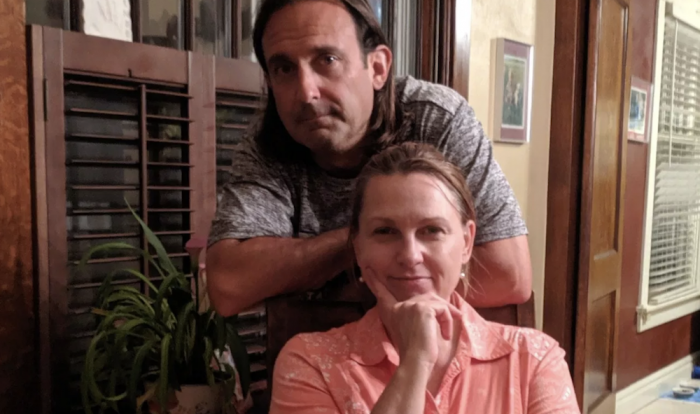We arrive early every Sunday morning.
My wife, Sheri, is in charge of Sunday school, and I make sure the acolytes are ready to go.
We greet our friends and the visitors when they enter the sanctuary. Our daughter often works in the nursery, my oldest son helps with the sound system, and “the littles” (our affectionate name for our youngest two boys) do whatever odd jobs the ministers find for them.
All the regulars know I am a recovering alcoholic because I’ve given a sermon about my struggles and I’m open about my recovery. Everyone in that sanctuary is struggling with something—parenting challenges, job stress, the loss of a loved one, or failing health. They come to church for the comfort of worshiping in fellowship.
My family is admired by our congregation. The respect is given because we truly enjoy taking such an active role in the life of our church. But that’s not the only reason. People who are struggling admire those of us who have faced our demons (especially if we are among the few willing to talk openly about it), and my recovery from alcoholism fits that bill.
But our Sunday morning friends don’t know what they don’t know. My family—with our washed faces, combed hair, and bright smiles—is not, in truth, the picture of joyful serenity that we seem. There is normal pressure and stress from work and school lying under the surface, as with any family.
But there is also something more. While my recovery from addiction is going well, the toll it is taking on my marriage is destructive—and mounting. And no one has any idea how much pain Sheri and I are hiding.
Forgiveness Isn’t Enough
Drinking heavily causes major turmoil for relationships. Everyone knows that. But what most people don’t understand is that removing the alcohol does nothing to repair the damage. Removing the alcohol only pulls back the curtain, leaving our wounds exposed and making room for us to do the restorative work of addiction recovery.
I know that. My wife knows it, too. But knowing the intended destination and navigating the treacherous journey are two different things.
We have a weekly appointment with each other to talk about resentments of the past and work on building trust for the future. Every Thursday, we spend an hour or more exploring our emotions and feelings and digging up that which we have long pushed down.
We’ve made great progress. Really, we have. We’ve found compassion and forgiveness for my vicious, alcohol-induced insults and Sheri’s painful and effective retaliations.
But forgiveness doesn’t necessarily compel trust. While we’ve made significant progress, we still tiptoe around our relationship in a state of tenuous peace. We tread carefully, knowing our bond is not strong enough to withstand much of a jolt.
Last Sunday afternoon, our family attended a neighborhood party on the other end of the block. We told of our adventures in the Grand Canyon this summer and celebrated the announcement of the pregnancy of our neighbor across the street. Sheri brushed my back gently as she passed behind me once, and I kissed her on the cheek when she said something nice about me to friends from a few houses down. We stayed to help clean up when the festivities were over. We folded lawn chairs and collected recycling in perfect harmony as we restored the host’s backyard to its pre-party condition.
Our neighbors had no idea what Sunday night held for Sheri and me as we waved goodbye and retreated peacefully down the block. Within a couple of hours of the end of the party, we were locked in a futile and bitter clash about nothing in particular, and the gentle brush of my back and the kiss on Sheri’s cheek seemed an unimaginably tender fantasy.
Elusiveness of Trust
I have no legal issues with which to deal in the aftermath of my alcoholism. There was no financial collapse, no infidelity, and I did not lose a job. But our recovery from my alcoholism is not without serious collateral damage.
There is no trust in my marriage. Trust is so fundamental to the stability of a relationship that it feels like we live in a straw house and the Big Bad Wolf lives on the next street over. We can go from peaceful serenity to loveless meltdown in seconds—so fast we can’t stop it because we don’t even see it happening, even when it happens over and over again.
My wife’s father was an alcoholic. He died of cancer, probably brought on by decades of heavy drinking, when we were in our early 20s. In fact, his funeral was one of our first dates.
Do I refer to him as my father-in-law if he died before we were married? I don’t really know. Nor did I know at the time how impactful he would be on my life. Sheri felt abandoned by her father, who chose alcohol over her. And it was an easy segue to eventually transition that distrustful feeling over to me as she watched my love for booze grow increasingly important in my life.
Some people think daughters of alcoholics marry alcoholic men because they have unfinished business and are trying to fix something in their husbands they weren’t able to fix in their fathers. That’s not the case for Sheri and me. We got married because Sheri wasn’t as repulsed by my alcoholic behavior as she should have been. She was used to stubborn loudness and excuses about how everyone drinks too much sometimes. She didn’t want me to be an alcoholic, but the turmoil was familiar. I’ll stop short of calling it comfortable, but just barely.
Sheri posted many pictures on social media of our family vacation this summer. There were lots of little blue thumbs and little red hearts, and plenty of comments about how much fun we looked to be having and what a beautiful family we have. And all of it’s true. We did have fun. I am ridiculously blessed with a healthy, joyful, and loving family. But just as we look shined and polished at Sunday morning worship or the neighborhood block party, there is a current of treacherous uncertainty roiling just below the calm surface. And when we smile for vacation photos, the happiness isn’t fake, but it’s tenuous and fleeting. One wrong word spoken or careless gesture can send Sheri and me reeling back into the pit of despair.
Trust is like padding for our hearts. It isn’t impenetrable, but it is a buffer. Trust doesn’t prevent heartache, but it prevents accidental injury from carelessness or haste. Trust protects us from our own humanity. Our flaws and insensitivities are brushed easily aside when we trust one another. We don’t need to expend wasted energy protecting ourselves when we trust that our spouse is incapable of intentionally harming us. Trust lubricates the rough spots of marriage and softens our occasional falls.
Unlearning a Life-Long Lesson
My wife spent her childhood learning not to trust men. The deceit and denials of my alcoholism reinforced the lesson. Don’t be fooled by the vacation photos or the warm greeting we extend on Sunday morning. They are real and genuine, but they don’t tell the full story. They mask the deep and relentless pain that occupies the space left vacant by a lack of trust.
Recovery from addiction is about so much more than sobriety. I thought abstinence from alcohol would be hard, and it was. I thought earning my wife’s forgiveness for my drunken antics and insults would require patience and persistent sorrow, and it did. But sobriety and forgiveness are not enough to restore a foundation that never existed to begin with.
People think alcoholism is about a bum drinking himself to death in the gutter or a sweaty man in a sleeveless white T-shirt beating his wife because dinner is late. As long as those tragic and extreme scenes are the face we put on alcoholism, we have no hope of understanding.
The true face of alcoholism is smiling in vacation photos. The true face of alcoholism greets you warmly on Sunday morning. The true face of alcoholism kisses his wife’s cheek as they enjoy hors d’oeuvres and banter.
For the true face of alcoholism, sobriety is just the necessary first step. Forgiveness is the hard-earned second step.
And like a plant needs water and sunshine in order to grow, trust will sprout with sobriety and forgiveness. At least I hope I’m right. Our aching hearts could use some padding.
~
If you’re ready to take the first step toward forgiveness and trust, please download and read my free e-book, Guide to Early Sobriety.

 Share on bsky
Share on bsky







Read 22 comments and reply